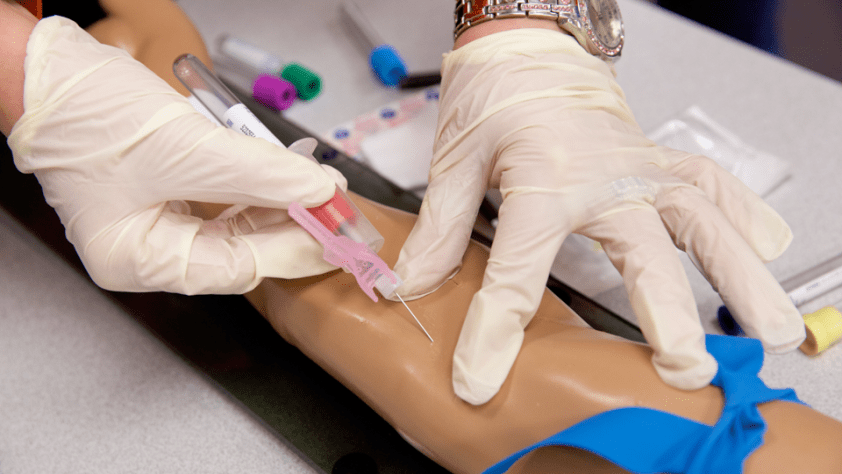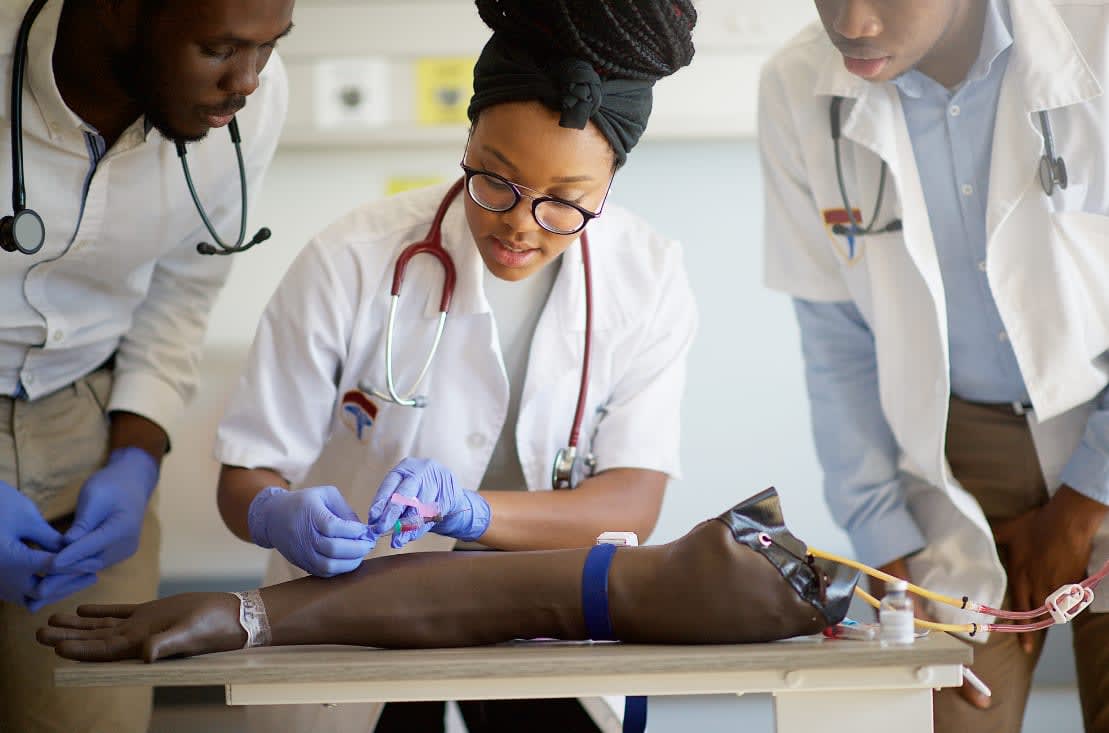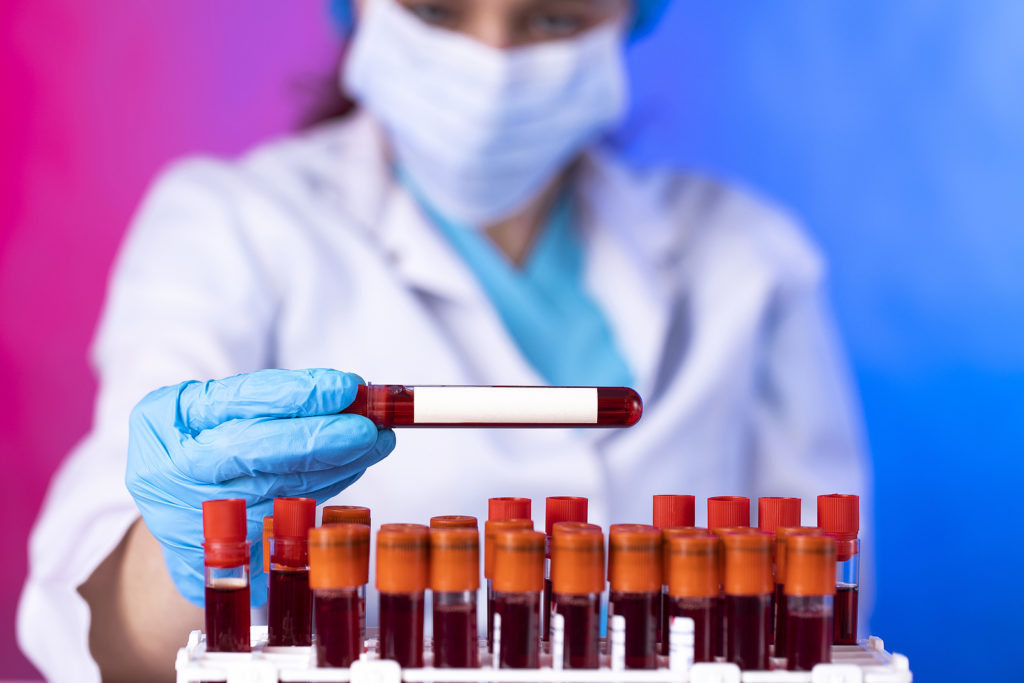Phlebotomy Training Course: Licensing Requirements Explained
Phlebotomy Training Course: Licensing Requirements Explained
Blog Article
What You Need to Know Before Beginning a Phlebotomy Training Training Course for Future Success
Before you begin a phlebotomy training course, it's necessary to recognize what the function entails and the skills you'll need to do well. You'll likewise desire to take right into account certification requirements certain to your state.
Recognizing the Role of a Phlebotomist
Phlebotomists play an essential duty in the healthcare system, as they are accountable for drawing blood examples for tests, transfusions, or donations. You'll discover yourself working in different setups, like healthcare facilities, centers, and labs, where accuracy and professionalism and trust are vital. Every day, you'll communicate with clients, discussing procedures to alleviate their anxiousness, which helps build depend on and relationship.
Your tasks include preparing tools, preserving a clean and sterile setting, and making certain accurate labeling and paperwork of samples. You'll additionally require to remain updated on safety methods and regulations, as patient safety and security is non-negotiable. Phlebotomists commonly work together with other health care specialists, adding to precise medical diagnoses and effective treatment strategies.
In this function, you must be detail-oriented and efficient, as well as have a strong sense of compassion. Being a phlebotomist isn't nearly injuring; it's about making a positive influence on patients' lives.
Secret Skills Required for Success in Phlebotomy
To flourish in phlebotomy, you'll require a mix of technical and social abilities that set you apart from others in the health care field (Phlebotomy school). Initially, grasping venipuncture methods is crucial; you ought to fit with needles and find out to injure successfully. Focus to information is very important, as accurate labeling and documents can substantially affect person treatment
Interpersonal abilities also play an important role. You'll interact with individuals consistently, so being empathetic and approachable assists reduce their stress and anxiety. Excellent interaction abilities are very important for explaining treatments and making certain individuals feel educated and safe.
Furthermore, time monitoring and business abilities will maintain you reliable, especially in hectic health care setups. Staying updated on security methods and laws is non-negotiable to guarantee both your safety and that of your people. By honing these skills, you'll position yourself for success in the vibrant field of phlebotomy.
Choosing the Right Phlebotomy Training Program
Exactly how can you ensure you're selecting the ideal phlebotomy training program for your needs? Beginning by researching certified programs in your location.

Think about the program's duration and adaptability. If you have a hectic schedule, try to find choices with evening or weekend courses. Inquire regarding work positioning help. A program that helps you secure a job post-training can provide you a substantial advantage in your phlebotomy career. With these consider mind, you'll discover a program that fits your objectives and collections you up for success.
Qualification and Licensing Demands
When it involves beginning your phlebotomy job, understanding accreditation and licensing needs is essential. Each state has details laws you require to adhere to, so it's essential to research study what applies to you. Additionally, you'll have to navigate the qualification test process to ensure you're totally certified.
State-Specific Rules
While pursuing a profession in phlebotomy, recognizing state-specific laws for certification and licensing is essential. In addition, some states might mandate a certain number of clinical hours or a particular level of training before you can function as a phlebotomist. By understanding what's needed, you'll be better prepared to begin your phlebotomy profession successfully.
Accreditation Examination Process
As you prepare for a profession in phlebotomy, understanding the accreditation test procedure is important to your success. Research study the certifying companies, like the National Phlebotomy Organization or the American Society of Phlebotomy Technicians. Each has details needs, consisting of training, medical experience, and application fees.
Work Market Outlook for Phlebotomists
As you take into consideration a job in phlebotomy, it is critical to comprehend the task market outlook. Demand for proficient phlebotomists gets on the rise, driven by the growing medical care market. You'll additionally would like to know what wage assumptions to expect as you step into this satisfying area.
Work Demand Fads
Health centers, centers, and blood donation facilities are proactively seeking certified phlebotomists to meet the requirements of patients requiring regular blood work and specialized tests. With a focus on preventive treatment and very early diagnosis, your abilities in phlebotomy will be essential. Staying upgraded with certifications and training can boost your employability and placement you positively in this expanding task market.
Income Expectations Summary
Phlebotomists can anticipate an affordable income that reflects their skills and the expanding need in the health care field. Usually, you might gain between $35,000 and $45,000 annually, depending upon your area, experience, and the facility you work for. In urban locations, salaries have a tendency to be higher as a result of the price of living and boosted demand for healthcare services. Additionally, certification can boost your gaining prospective, making you a much more attractive candidate. Numerous phlebotomists also delight in advantages such as health insurance coverage and retirement, which can further include in your total compensation. As the market remains to increase, task possibilities and income leads for phlebotomists are likely to boost, making this an encouraging occupation selection.
Possible Profession Paths and Development Opportunities
While pursuing a phlebotomy training course, you could uncover a range of job paths and advancement chances that await you in the health care field. As a licensed phlebotomist, you can operate in health centers, blood donation facilities, or diagnostic labs. Each setting deals distinct experiences and obstacles, permitting you to refine your abilities.
You can also explore specializations, such as becoming a contributor phlebotomy specialist or a lab assistant. These roles usually supply additional training and can lead to greater incomes.
Networking within the medical care community can additionally aid you discover work openings and mentorship possibilities. Welcome these possibilities, and you'll locate that your phlebotomy job can evolve in interesting ways.
Tips for Being Successful in Phlebotomy Training and Beyond

Practice makes perfect, so benefit from any type of hands-on possibilities. Acquaint yourself with different strategies and devices to develop your confidence. Keep a positive attitude, as your mindset can significantly affect your performance.
Network with sector specialists and look for mentorship; this can bring about valuable understandings and job chances after graduation. Think about continuing education or certifications to improve your abilities and remain upgraded in the area. By complying with these suggestions, you'll not just prosper in your training but additionally lay a solid foundation for a satisfying profession in phlebotomy.
Often Asked Questions
What Is the Average Expense of Phlebotomy Training Programs?
The standard expense of phlebotomy training programs normally varies from $700 to $2,500, relying on the institution and place. You need to investigate numerous alternatives to find a program that fits your budget plan and needs.
For How Long Does Phlebotomy Training Commonly Take to Total?

Exist Age Restrictions for Register in Phlebotomy Courses?
There aren't rigorous age constraints for phlebotomy training courses, however the majority of programs need you to be at the very least 18. Some might approve more youthful trainees with parental permission or if you're enlisted in a related instructional program.
Can I Work While Attending Phlebotomy Training?
Yes, you can function while going to phlebotomy training. Lots of students handle part-time tasks along with their studies. Simply see to it to stabilize your schedule properly, so you can focus on both job and your training.
What Product Do I Need for Phlebotomy Training?
For phlebotomy training, you'll need individual protective equipment like gloves Phlebotomy Classes Near Me and masks, laboratory coats, a sharps container, alcohol wipes, needles, and blood collection tubes. Ensure you have actually got whatever prepared prior to your very first class begins.
Report this page